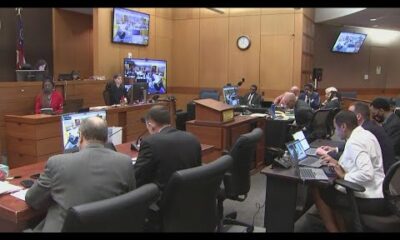Mississippi Today
On this day in 1750


Nov. 4, 1750

Jean Baptiste Point DuSable, the “Father of Chicago,” was born.
A man of African descent, he became the first known settler in the area that became the city of Chicago. He married a Potawatomi woman, Kitiwaha (Catherine), and they had two children.
According to records, the property included a log cabin with two barns, a horse-drawn mill, a bakehouse, a poultry house, a dairy, a smokehouse, a fenced garden and an orchard. At his trading post, DuSable served Native Americans, British and French explorers and spoke a number of languages.
“He was actually arrested by the British for being thought of as an American Patriot sympathizer,” Julius Jones, curator at the Chicago History Museum told WLS, but DuSable beat those charges.
In Chicago today, a school, street, museum, harbor, park and bridge bear his name. The place where he settled near the mouth of the Chicago River is now a National Historic Landmark, part of the city’s Pioneer Court.
This article first appeared on Mississippi Today and is republished here under a Creative Commons license.![]()
Mississippi Today
On this day in 1841


Dec. 3, 1841

Frederick Douglass founded and edited his first antislavery newspaper, “The North Star,” in Rochester, New York. The publication title referred to Polaris, the bright star that helped guide Black Americans escaping slavery: “To millions, now in our boasted land of liberty, it is the STAR OF HOPE.”
He explained in this first issue that he desired to see “in this slave-holding, slave-trading, and negro-hating land, a printing-press and paper, permanently established, under the complete control and direction of the immediate victims of slavery and oppression … that the man who has suffered the wrong is the man to demand redress,—that the man STRUCK is the man to CRY OUT—and that he who has endured the cruel pangs of Slavery is the man to advocate Liberty.”
The publication also sought to “promote the moral and intellectual improvement” of people of color. He championed not only for the freedom of those enslaved, but for women’s rights as well with the motto, “Right is of no sex. Truth is of no color. God is the father of us all, and all we are brethren.”
In 1851, the paper merged with the Liberty Party Paper from Syracuse and became known as Frederick Douglass’ Paper. The paper closed during the Civil War, and in 1870, he moved from Rochester to Washington, D.C., and became part owner of the New National Era, which attacked the rise of the Ku Klux Klan and the mistreatment of and violence against Black Americans throughout the nation. His sons ran the newspaper until it folded in 1874. Because of a fire, no known collection exists of all of Douglass’ newspapers.
This article first appeared on Mississippi Today and is republished here under a Creative Commons license.![]()
Mississippi Today
Two years after Jimmie ‘Jay’ Lee’s disappearance, accused killer goes on trial

More than two years after Jimmie “Jay” Lee disappeared, sparking fear in Oxford’s small LGBTQ+ community, a University of Mississippi graduate will stand trial on capital murder charges this week.
Sheldon Timothy Herrington, Jr., is accused of killing Lee, a fellow Ole Miss graduate who was pursuing a master’s degree in social work, in an effort to keep their casual relationship a secret, according to arguments prosecutors made during Herrington’s preliminary hearing two years ago.
Herrington is charged with capital murder for allegedly kidnapping Lee, then killing him, according to the indictment. If convicted, Herrington faces the death penalty or life in prison without the possibility of parole.
The 24-year-old was indicted by a Lafayette County grand jury last year. He is being represented by state Rep. Kevin Horan. In interviews with Mississippi Today and other media outlets, members of Herrington’s family, who lead a prominent church in Grenada, have vociferously defended his innocence.
Herrington is charged with capital murder for allegedly kidnapping, then killing, Lee. If convicted, he faces the death penalty or life in prison without the possibility of parole.
“We’re all in shock, we’re all devastated, and we are all looking forward to proving his innocence,” Herrington’s half-brother, Tevin Coleman, said two years ago.
Dozens of people from Herrington’s hometown, including the then-superintendent and Grenada County Sheriff, have written letters to the court on his behalf before evidence was presented during 2022’s preliminary hearing.
In Oxford, Lee’s disappearance and death led his friends to organize a local movement, called Justice for Jay Lee, in an effort to remember Lee’s life. They have protested outside the Lafayette County Courthouse so loudly their chants could be heard during proceedings. They have tailgated in the Grove and tabled during local drag shows where Lee performed.
“It doesn’t feel real, especially since they haven’t found his body,” Braylyn Johnson, one of Justice for Jay Lee’s main organizers, told Mississippi Today two years ago. A fellow Ole Miss student, Johnson lived with Lee during the pandemic.
The trial will be presided over by Judge Kelly Luther. It was originally slated for earlier this fall but was postponed due to a lack of hotel availability for jurors during football season.
Anticipating the coverage, Luther ruled earlier this fall that jurors will be brought in from outside the county after denying a joint motion to seal all pre-trial filings in the case.
The jury is being selected in Forrest County, but there is nothing in the case file to indicate from which county jurors were being chosen.
Last week, Luther ordered that any public demonstrations in relation to the case will occur in the park next to City Hall. The potentially lengthy proceedings at the Lafayette County Courthouse are expected to bring significant media attention to the small north Mississippi college town.
Lafayette County District Attorney Ben Creekmore did not respond to a request for comment from Mississippi Today. A special prosecutor has been appointed to assist him.
Herrington has been out on bond since December 2022. Lee was declared legally dead earlier this month, but police have not recovered his body. The public has received little information about Lee’s potential whereabouts, or what efforts police have undertaken to find him.
Lee went missing on July 8, 2022, and Herrington was arrested a few weeks later. During the preliminary hearing, an Oxford Police Department detective testified to a plethora of evidence, including Snapchat and text messages, Google searches and video surveillance.
According to cellphone location data, Lee’s last location was in the vicinity of Herrington’s apartment on July 8.
Earlier that morning, the two exchanged messages about a fight they’d had. Herrington asked Lee to come back to his apartment, and Lee responded that he thought Herrington was “just tryna lure me over there to beat my ass or something.”
At 5:56 a.m., minutes after Lee messaged Herrington he was on his way, Herrington searched “how long does it take to strangle someone gabby petito,” then “does pre workout boost testosterone.”
Less than an hour later, video surveillance shows Herrington buying duct tape at Walmart and, later that day, retrieving a long-handle shovel and wheelbarrow from his parent’s house in Grenada and putting it in the back of a box truck that he used for a moving business.
During the police investigation, DeSoto County Sheriff’s Department “cadaver dogs” — K-9s that are trained to identify the smell of a dead body – “alerted” three times in Herrington’s bedroom, once in his living room and in his car.
During the preliminary hearing, Horan repeatedly questioned if the police had reviewed the dogs’ training or checked if the dogs had ever before correctly identified the smell of a dead body.
Last week, the prosecution agreed to withdraw evidence stemming from “the K-9s searches or purported detection of human remains” after Horan filed a motion to exclude it.
Horan has also filed a motion to dismiss the indictment on technical grounds.
Read Mississippi Today’s previous reporting on the case here.
Justice Reporter Mina Corpuz contributed to this report.
This article first appeared on Mississippi Today and is republished here under a Creative Commons license.![]()
Mississippi Today
On this day in 1986


Dec. 2, 1986

Mike Espy became the first Black congressman elected from Mississippi since Reconstruction. Born in Yazoo City, his grandfather was Thomas J. Huddleston Sr., founder of the Afro-American Sons and Daughters, which operated the Afro-American Hospital, providing health care to Black Mississippians until the 1970s. He learned soon about the color line, becoming the only Black student in a newly integrated high school.
He recalled carrying a stick to fend off racist attacks: “Relative to the civil rights experiences of snarling dogs and whips and things it was pretty tame. But I’d always have a fight. The teacher would leave the room, and then you’re among 35 in the classroom and they’d make racial jeers.”
He became a lawyer, working as an attorney for Central Mississippi Legal Services from 1978 to 1980. Between 1980 and 1984, Espy worked as assistant secretary of the Public Lands Division for the State of Mississippi and then served as assistant state attorney general for Consumer Protection.
In 1984, he served on the rules committee for the 1984 Democratic National Convention, drawing the attention of the party. In his historic campaign in 1986, he campaigned door to door for votes with his slogan, “Stand by Me, Pray for Me, Vote for Me.”
While serving as congressman, he emphasized economic development in the Delta, winning reelection three times. In 1993, he became the first Black American to serve as secretary of agriculture, ushering in a wave of reform. Four years later, he was indicted on charges of receiving improper gifts, but a jury acquitted him of all charges.
He ran for the U.S. Senate in 2018, where he lost to Republican incumbent Cindy Hyde-Smith, who drew national attention after she remarked that she would “be in the front row” of a “public hanging” if invited by a political supporter. The remark created a firestorm because of Mississippi’s history of lynchings. She later responded, “For anyone that was offended by my comments, I certainly apologize,” claiming her remark had been twisted and “turned into a weapon” against her.
Espy lost again in a rematch in 2020.
This article first appeared on Mississippi Today and is republished here under a Creative Commons license.![]()
-

 News from the South - Missouri News Feed7 days ago
News from the South - Missouri News Feed7 days agoCar thieves target Town and Country neighborhood
-

 News from the South - Louisiana News Feed5 days ago
News from the South - Louisiana News Feed5 days ago12-year-old boy overcomes disability to pursue sports, adventures
-

 News from the South - Arkansas News Feed6 days ago
News from the South - Arkansas News Feed6 days agoUniversity of Arkansas- Fort Smith food pantry keeps students fed around the holidays
-

 News from the South - Georgia News Feed6 days ago
News from the South - Georgia News Feed6 days agoJurors to continue deliberating after holiday on YSL RICO trial
-

 Local News7 days ago
Local News7 days agoChuck Woolery, smooth-talking game show host of ‘Love Connection’ and ‘Scrabble,’ dies at 83
-

 News from the South - Arkansas News Feed5 days ago
News from the South - Arkansas News Feed5 days agoCare Community Center serves hundreds with free Thanksgiving meal
-

 News from the South - Alabama News Feed3 days ago
News from the South - Alabama News Feed3 days agoFreezing conditions in Alabama's forecast through Wednesday. Chilly afternoon for Iron Bowl Satur…
-

 News from the South - Alabama News Feed4 days ago
News from the South - Alabama News Feed4 days agoThe next several mornings will be freezing cold all across Central Alabama.




























